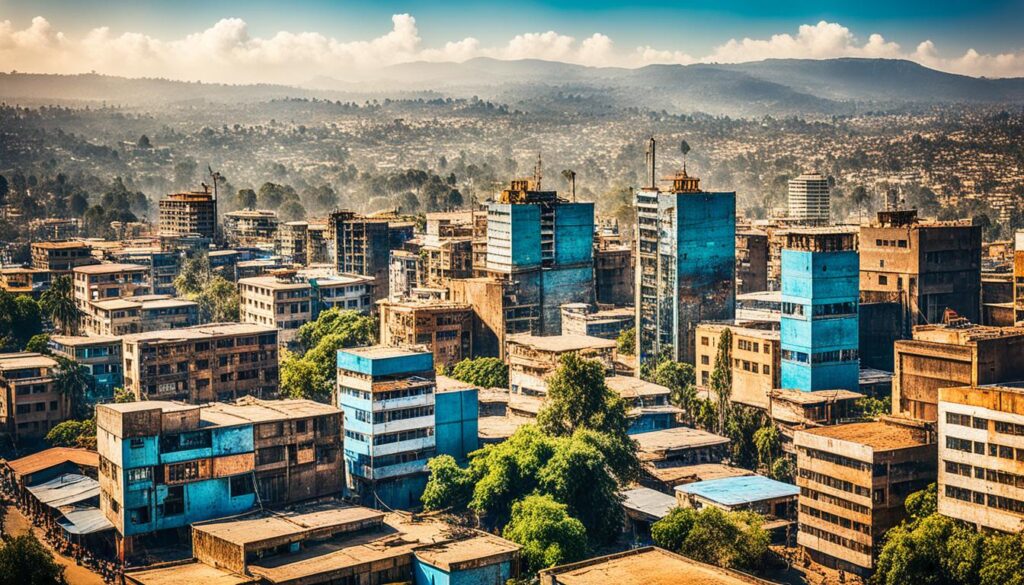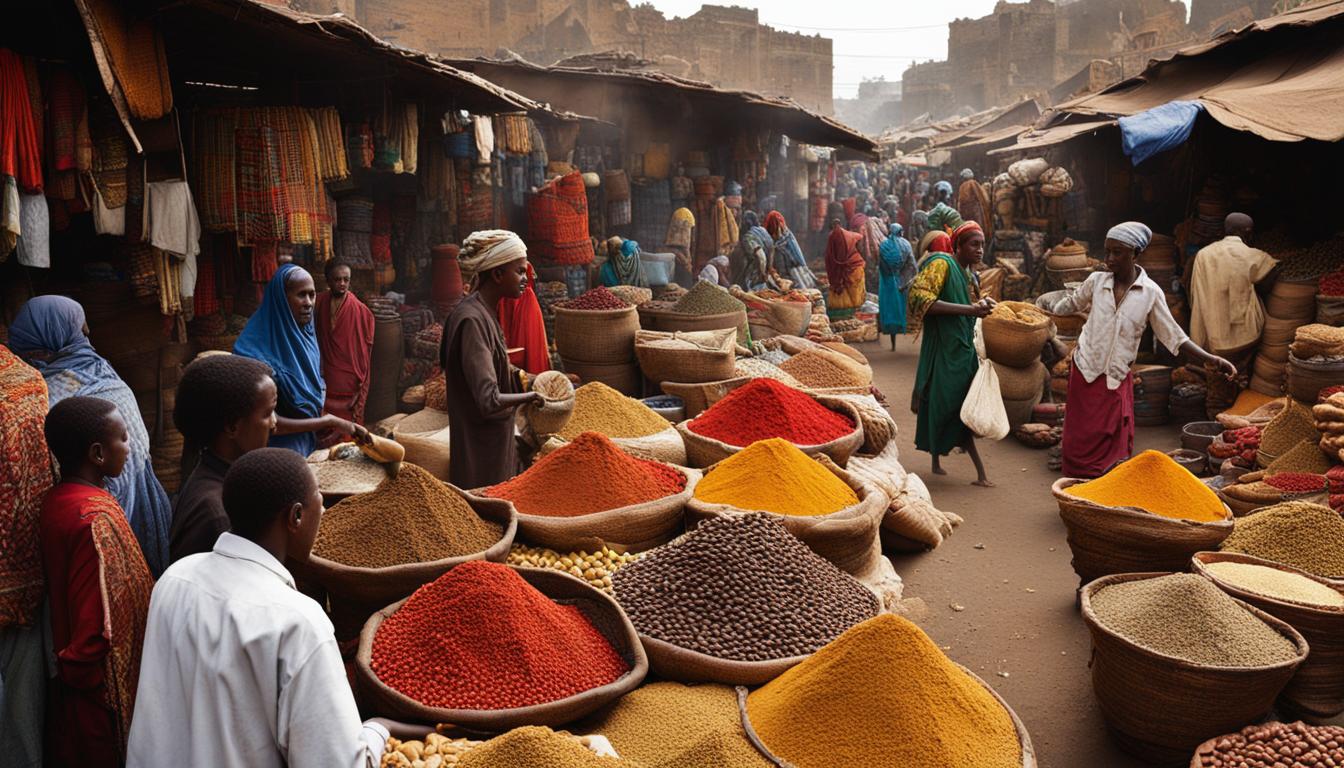How Does Ethiopia Make Money?
Did you know that agriculture accounts for a staggering 46% of Ethiopia’s GDP and employs 85% of its total workforce?
Ethiopia, often referred to as the “birthplace of coffee,” relies heavily on its agricultural sector to generate revenue and drive economic growth. However, there are several other industries and sectors that contribute to Ethiopia’s economy and position the country as a rising economic power in Africa.
Key Takeaways:
- Agriculture is the backbone of Ethiopia’s economy, accounting for 46% of its GDP.
- The top industries in Ethiopia include food processing, beverages, textiles, and leather.
- China, India, and the United States are Ethiopia’s top trade partners.
- Ethiopia’s exports primarily consist of coffee, spices, vegetables, and oil seeds.
- The services sector, particularly tourism, plays a significant role in Ethiopia’s economy.
Agriculture as the Backbone of Ethiopia’s Economy
Agriculture plays a vital role in the Ethiopian economy, accounting for nearly half of the country’s GDP. The agricultural sector in Ethiopia comprises three main activities: subsistence smallholder farming, cash cropping, and subsistence livestock raising.
Subsistence smallholder farming, the most significant agricultural activity, focuses on the production of staple grains, pulses, and other essential crops that form the foundation of the Ethiopian diet. This type of farming ensures food security at the national level and provides employment opportunities for rural communities.
Cash cropping is another key aspect of Ethiopian agriculture, with coffee and oilseeds being the primary cash crops. Coffee, in particular, holds immense economic value as Ethiopia is one of the world’s top coffee producers. The export of these commodities not only generates income but also contributes to the country’s global trade standing.
“Ethiopia’s agricultural sector has the potential for further growth and can meet both domestic and export demands.”
Agriculture also encompasses subsistence livestock raising, which is predominant in the lowlands of Ethiopia. The country is home to a large number of cattle, making livestock an essential source of income and livelihood for many Ethiopians.
The agricultural sector in Ethiopia provides significant opportunities for income generation, poverty reduction, and economic development. Through sustainable farming practices and investment in agricultural infrastructure, Ethiopia can harness its agricultural potential to meet the needs of its growing population and contribute to the national economy.
The Role of Agriculture in Poverty Reduction
Agriculture is not only crucial for economic growth but also plays a vital role in poverty reduction. In Ethiopia, where a large portion of the population depends on agriculture for their livelihoods, advancements in agricultural productivity directly impact household incomes and living standards.
By improving access to modern farming techniques, quality seeds, irrigation systems, and market linkages, the agriculture sector can uplift rural communities and create sustainable income opportunities. Investments in rural infrastructure, such as roads and storage facilities, can facilitate the transportation and storage of agricultural produce, reducing post-harvest losses and improving market access for farmers.
Moreover, ensuring equitable access to land, credit, and technical assistance for smallholder farmers can enable them to increase their productivity and improve their livelihoods. By prioritizing agricultural development and implementing supportive policies, Ethiopia can enhance its resilience to food insecurity and drive inclusive economic growth.
Meeting Domestic and Export Demands
Ethiopia’s agricultural sector not only caters to the domestic market but also contributes significantly to the country’s export industry. The export of agricultural commodities, such as coffee, oilseeds, spices, and vegetables, generates foreign exchange earnings and strengthens Ethiopia’s position in global trade.
The availability and quality of Ethiopian agricultural products have gained international recognition, making them highly sought after by global consumers. With increasing demand for organic and sustainably produced goods, Ethiopia has an opportunity to further develop its agriculture sector and establish itself as a supplier of premium quality products.
| Main Agricultural Activities in Ethiopia | Key Commodities |
|---|---|
| Subsistence Smallholder Farming | Staple grains, pulses, and other crops |
| Cash Cropping | Coffee, oilseeds, spices, and vegetables |
| Subsistence Livestock Raising | Cattle and other livestock |
The Growth of Ethiopia’s Industries
Ethiopia’s industrial and manufacturing sectors have witnessed steady growth in recent years. These sectors play a significant role in contributing to the country’s overall GDP and provide employment opportunities for its population. The top industries in Ethiopia include food processing, beverages, textiles, and leather.
Food processing industry, which involves the transformation of raw agricultural products into processed food and beverage products, has seen substantial progress. It encompasses activities such as milling, canning, and packaging. The beverage industry comprises the production of various non-alcoholic and alcoholic beverages, including soft drinks, juices, and beer.
The textile and garment industry contributes significantly to Ethiopia’s manufacturing sector. The country has favorable conditions for cotton production, making it an ideal location for textile and garment manufacturing. The leather industry is also prominent in Ethiopia, utilizing locally sourced raw materials to produce high-quality leather products such as shoes, bags, and accessories.
Ethiopia has been making efforts to attract foreign direct investment (FDI) in its industrial sector, particularly in manufacturing. The government has implemented various policies and incentives to support and encourage investment in industries. These include tax breaks, access to land and infrastructure, and streamlined processes for establishing businesses.
Investing in Ethiopia’s industrial sector presents an opportunity for businesses to tap into a growing market, leverage a skilled and affordable labor force, and benefit from the country’s strategic location for regional trade.
Foreign Direct Investment in Ethiopia’s Industrial Sector
Foreign direct investment (FDI) has played a crucial role in the development of Ethiopia’s industrial sector. The government’s emphasis on attracting FDI is aimed at promoting economic growth, job creation, and technology transfer. By encouraging foreign companies to invest and establish their operations in Ethiopia, the country aims to diversify its economy and promote sustainable development.
Ethiopia offers several advantages to foreign investors, such as a large domestic market, abundant natural resources, and a young and growing population. Additionally, the government’s commitment to improving infrastructure, enhancing the business climate, and providing investment incentives further attracts foreign investors.
Investment Opportunities in Ethiopia’s Export Industry
The export industry in Ethiopia holds significant potential for growth and development. With its favorable agro-ecological conditions, the country is well-suited for producing a wide range of agricultural commodities for export.
The table below highlights some of the key export products from Ethiopia:
| Exported Goods | Main Export Markets |
|---|---|
| Coffee | Europe, North America |
| Spices | Middle East, Europe |
| Vegetables | Middle East, Europe |
| Oil Seeds | Middle East, Asia |
The export industry provides an opportunity for Ethiopia to generate revenue, create employment, and strengthen its trade relations with other countries. With ongoing efforts to improve trade infrastructure, enhance product quality and standards, and diversify export markets, Ethiopia aims to expand its presence in the global trade arena.
Harnessing Ethiopia’s Resources for Economic Development

While agriculture remains the backbone of Ethiopia’s economy, the country is also endowed with valuable mineral resources that have the potential to contribute to its economic development. Ethiopia possesses significant reserves of gold, tantalum, and other minerals, offering opportunities for both local and foreign investors. The exploration and exploitation of these mineral resources can stimulate economic growth, create employment opportunities, and generate revenue for the country.
Additionally, Ethiopia has untapped reserves of petroleum and natural gas. With the increasing global demand for energy, developing these resources could not only meet domestic energy needs but also provide a source of revenue through exportation.
Ethiopia has been harnessing its natural resources to support its economic development by focusing on hydroelectric power generation. The country has multiple hydroelectric power stations situated strategically across its territory, making use of its numerous rivers. Hydroelectricity is a renewable and reliable energy source that contributes to reducing Ethiopia’s dependence on imported fossil fuels while promoting sustainable development.
However, it is important to note that some of these projects have faced controversies. For instance, the construction of the Gilgel Gibe III dam and the Grand Ethiopian Renaissance Dam (GERD) has raised concerns regarding environmental impact and regional water security. These issues highlight the need for careful planning and sustainable practices in utilizing Ethiopia’s natural resources for economic development.
The government of Ethiopia recognizes the importance of expanding access to electricity in rural areas as part of its economic development agenda. By improving energy infrastructure, particularly in remote regions, Ethiopia aims to foster economic growth, enhance living standards, and drive sustainable development.
Overall, Ethiopia’s commitment to harness its diverse resources, both natural and renewable, showcases its determination to achieve economic development and reduce poverty. By attracting foreign investment and implementing sustainable practices, Ethiopia is positioning itself as a key player in the global economic landscape.
Engaging in Global Trade

When it comes to global trade, Ethiopia has a strong presence in the export market. The country’s economy heavily relies on agrarian-based exports, with coffee being the most important commodity. In addition to coffee, Ethiopia exports a variety of goods, including oilseeds, live animals, hides and skins, and khat.
On the other hand, Ethiopia also imports various products to meet domestic demands and support its industries. The country imports machinery, vehicles, petroleum products, and chemical products, among others.
In recent years, Ethiopia has been making efforts to diversify its export market and attract more foreign direct investment. This strategic move aims to enhance the country’s economic growth and development. Ethiopia has established trade relationships with several countries, including China, the United States, India, and Saudi Arabia.
The Significance of Ethiopian Trade
Our engagement in global trade plays a crucial role in Ethiopia’s economic development. By exporting our agricultural products and importing necessary goods, we contribute to the growth of our economy and foster international relationships. Through trade, we not only enhance our financial stability but also create opportunities for employment and industry advancement in Ethiopia.
The Challenges and Opportunities
Engaging in global trade comes with its own set of challenges and opportunities. On one hand, the diversification of export markets creates avenues for growth and expansion, allowing Ethiopia to tap into international demand and secure more stable revenue sources. On the other hand, there are challenges such as market fluctuations, trade barriers, and competition to navigate.
However, by implementing effective trade policies, investing in infrastructure, and promoting favorable business environments, Ethiopia can maximize the benefits of global trade and further boost its economic potential.
| Exported Goods | Imported Goods |
|---|---|
| Coffee | Machinery |
| Oilseeds | Vehicles |
| Live Animals | Petroleum Products |
| Hides and Skins | Chemical Products |
| Khat |
Note: The above table highlights some of the key exported and imported goods in Ethiopia’s global trade.
We are committed to fostering strong trade relationships and expanding our presence in the global market. Through strategic trade practices, Ethiopia’s export industry will continue to thrive, contributing to the overall economic advancement of our nation.
The Role of Services in Ethiopia’s Economy
The services sector plays a significant role in the economic development of Ethiopia. In particular, tourism contributes considerably to the country’s GDP, showcasing Ethiopia’s historical and cultural attractions to the world. We promote destinations such as the breathtaking rock-hewn churches of Lalibela and the ancient ruins in Aksum, enticing travelers with our rich heritage and natural beauty.
However, the tourism industry has faced challenges due to political instability and conflicts in the region. Despite these obstacles, we remain committed to promoting Ethiopia as a top destination for tourists seeking unique experiences.
Relying on both financial and technical support, Ethiopia receives economic aid from various sources to undertake development projects and address social and economic challenges. This aid enables us to invest in infrastructure development, improve local communities, and enhance the overall quality of life for our citizens.
“Tourism has the potential to transform the lives of our people, create employment opportunities, and uplift local economies. We are committed to harnessing the power of this sector to drive economic growth and development in Ethiopia.”
By strategically leveraging our cultural heritage and natural resources, we aim to further boost the services sector, thus contributing to the overall growth of the Ethiopian economy. Additionally, we continuously focus on developing sustainable tourism practices to preserve our cultural landmarks and protect the environment for future generations.
In summary, services, particularly tourism, play a vital role in Ethiopia’s economic development. Through promotion and investments, we are striving to create a thriving tourism industry that enriches our country economically, socially, and culturally.
| Key Points | Impact |
|---|---|
| Economic Contribution | Significant contribution to Ethiopia’s GDP, generating revenue and employment opportunities. |
| Tourism Attractions | Historical and cultural sites, such as the rock-hewn churches of Lalibela and ancient ruins in Aksum, attract tourists from around the world. |
| Challenges | Political instability and conflicts in the region impacting the tourism industry. |
| Economic Aid | Financial and technical support from various sources to undertake development projects and address social and economic challenges. |
| Sustainable Practices | Focusing on environmentally friendly and culturally sensitive tourism practices to protect Ethiopia’s natural and cultural heritage. |
The Path to Economic Growth for Ethiopia
Ethiopia’s economy has experienced significant progress in recent years, driven by strategic focus on agricultural development, industrial growth, and attracting foreign investment. These efforts by the Ethiopian government have played a pivotal role in fostering economic development and driving sustainable growth.
Despite these achievements, challenges still exist. There is a pressing need to generate more employment opportunities, improve infrastructure, and address social and economic inequalities within the country. Recognizing these challenges, Ethiopia is committed to further enhancing its economic landscape and realizing its full potential.
With its abundant resources and immense potential, Ethiopia is paving the way to become a middle-income country in the near future. The ongoing momentum towards economic diversification and the continuous focus on attracting foreign direct investment are vital to sustaining this growth trajectory.






